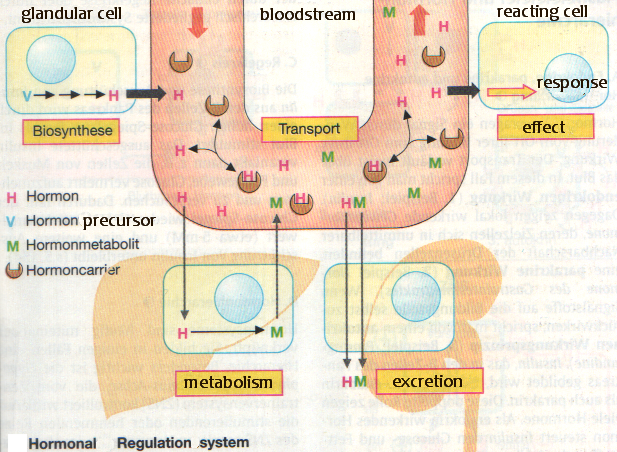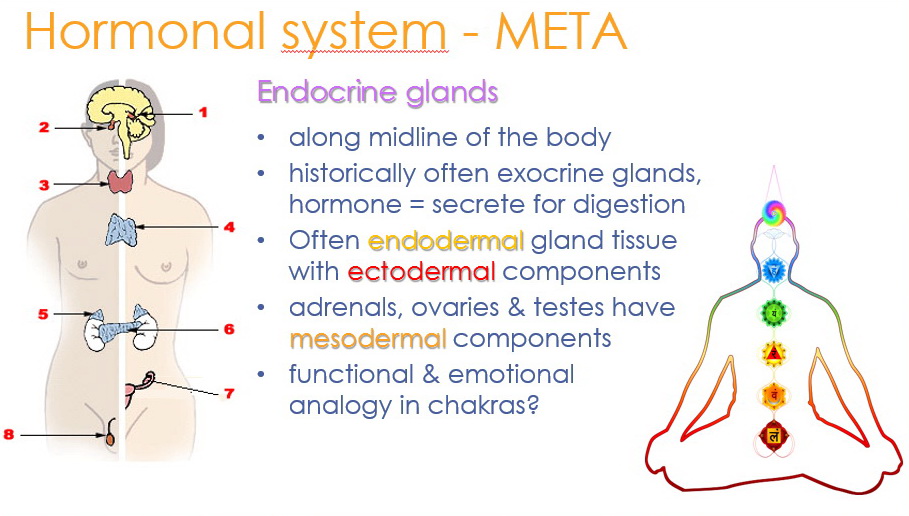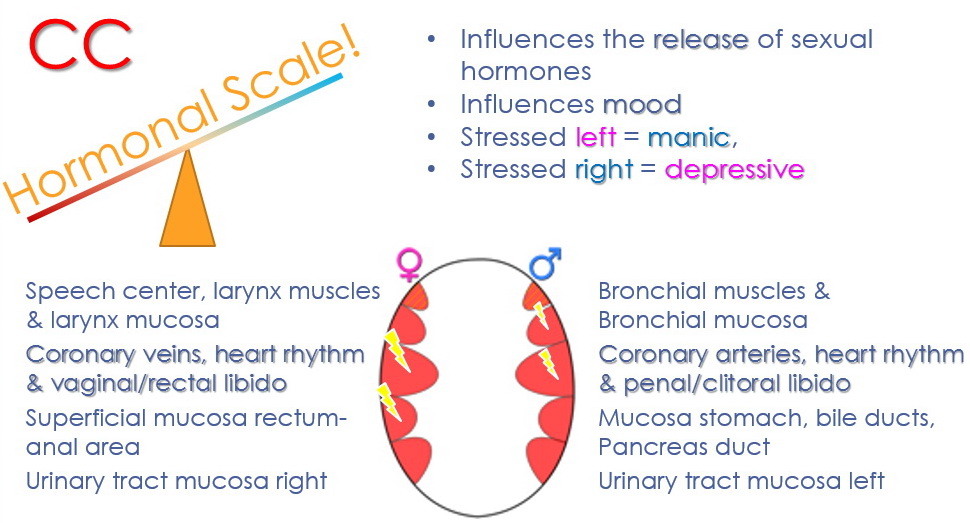The endocrine (greek for “inner secretion”) or hormonal system belongs, like the nervous system, to the steering mechanism of the body. While the nervous system uses electrical impulses for transmission, thereby effecting fast but short-lived reactions in the organs, hormones are spread via blood– and lymph vessels and can biochemically effect long-termed changes.
The bridge between nervous and hormonal systems is the hypothalamus in the brain, which steers the ANS as well as (via the pituitary) the release of hormones. Main goal is to maintain homeostasis while adapting to changes in the external and internal environment. Hormones control metabolism, growth, development, sleep and mood. Beside the specialized endocrine glands, also other organs have hormone-producing functions, like the kidneys, liver, and heart.
Hormone production uses cholesterol as base material, which is transformed into transmitters by specific enzymes. As their release is stimulated (by liberins from the pituitary), they enter the bloodstream through “windows” in the cell membrane and in the vessel wall. The cells in the effector organ possess receptors for the hormone, which also provide feedback to the brain.

According to evolutionary perspective, some endocrine glands have developed from exocrine organs. This is illustrated by their biological theme referring to assimilation and digestive functions: a chunk of value or information needs to be processed. In these glands, usually 2 themes and reaction patterns are present: from the Brain Stem (+/-) and the Cerebral Cortex (-/+). The Cortex pattern matches with that of “excretory ducts” in exocrine glands.

The release or inhibition of sexual hormones is influenced by the territorial relays situated in the insular region of the Cerebral Cortex. Constellations of these relays create a “hormonal scale” effecting manic or depressive moods.

META-Organs
According to the perspective of META-Health, organs and organ tissues in the endocrine system are distinguished on the basis of their unique stress-emotion-belief associations and brain relay locations.
- Pineal Gland – Brain Stem (+/-): too much light or darkness disturbing one’s natural rhythm
- Pituitary Gland – Anterior Lobe – Brain Stem (+/-): Survival of self and the kind, related to the respective hormonal function
- Pituitary Gland – Posterior Lobe – Cerebral Cortex (-/+): Social bonding & reproduction
- Thyroid Glands – Follicular Epithelium – Brain Stem (+/-): Inability to reach or rid oneself of a chunk/aim because of being too slow
- Thyroid Glands – Archaic Excretory Ducts / Ductus Thyreoglossus – Cerebral Cortex (-/+): Power-/ Helplessness or Frontal Fear
- Parathyroid Glands – Brain Stem (+/-): Inability to reach or rid oneself of a chunk/aim because of muscle function
- Thymus – mixed association: Individuality, self-esteem, acceptance
- Pancreas – Alpha Islet Cells – Cerebral Cortex (-/+): Resistance / Disgust
- Pancreas – Beta Islet Cells – Cerebral Cortex (-/+): Resistance / Disgust
- Adrenal Gland – Cortex – Cerebral Medulla (-/+): Orientation, wrong decision
- Adrenal Gland – Medulla – Brain Stem (+/-): Overload-Stress related to survival
- Testicles – Hormone production – Cerebral Medulla (-/+): Loss of a person
- Ovaries – Hormone Production – Cerebral Medulla (-/+): Loss of a person
- Hormonal Scale in Territorial Areas – Cerebral Insular Cortex (-/+): Position and rank in society
- Larynx mucosa: Speechlessness, fright/concurrence fear
- Bronchial mucosa: Speechlessness, fright/concurrence fear
- Coronary arteries intima: Loss of status or love
- Coronary veins intima: Loss of status or love
- Anal epithelium: Identity/concurrence
- Stomach & digestive gland ducts mucosa: Identity/concurrence
- Bladder & urinary tract mucosa: Position-marking, boundaries
The text links lead into the META-Wiki in MHI’s members portal
Study how biological programming impacts mental and physical health, and become a pathfinder to well-being!
graphic sources:
[1] picture quotation from http://docplayer.org/43083436-Was-haben-wir-nicht-angeschaut.html, edited for translation
[2], [3], [4] MHI
